
Ismail Kadare is an Albanian novelist, poet, essayist, screenwriter, and playwright. He is a leading international literary figure and intellectual. He focused on poetry until the publication of his first novel, The General of the Dead Army, which made him famous internationally.
Marin Barleti was a historian, humanist and Catholic priest from Shkodër. He is considered the first Albanian historian because of his 1504 eyewitness account of the 1478 siege of Shkodra. Barleti is better known for his second work, a biography on Skanderbeg, translated into many languages in the 16th to the 20th centuries.
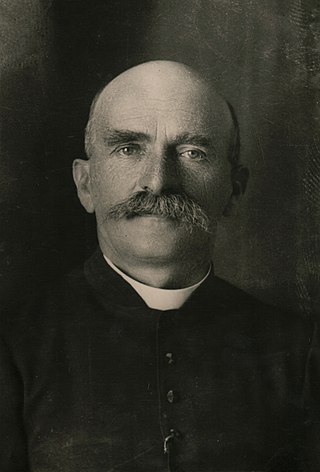
Ndre Mjeda was an Albanian philologist, poet, priest, rilindas, translator and writer of the Albanian Renaissance. He was a member of the Mjeda family.
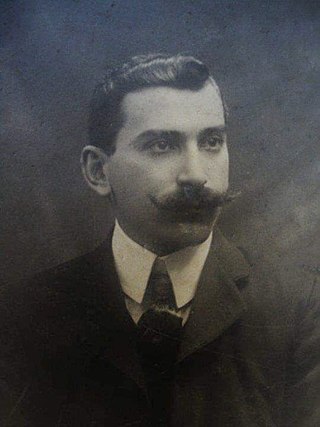
Luigj Gurakuqi was an Albanian writer and politician. He was an important figure of the Albanian National Awakening and was honoured with the People's Hero of Albania medal.
Albanian literature stretches back to the Middle Ages and comprises those literary texts and works written in Albanian. It may also refer to literature written by Albanians in Albania, Kosovo and the Albanian diaspora particularly in Italy. Albanian occupies an independent branch within the Indo-European family and does not have any other closely related language. The origin of Albanian is not entirely known, but it may be a successor of the ancient Illyrian language.

Gjekë Marinaj is an Albanian–American poet, writer, translator and literary critic who is also known as the founder of a form of arts criticism known as Protonism Theory. Currently living in the United States, he was the first president of the Society of Albanian-American Writers, established in 2001 and has published several books of poetry, prose and literary criticism. In 2008, Marinaj was awarded the Pjetër Arbnori Prize for literature by QNK, part of the Ministry of Tourism, Cultural Affairs, Youth and Sports of Albania. In 2021, he was the recipient of South Korea's Changwon KC International Literary Prize His writing and peacemaking work have received acclaim and many other honors in Albania and elsewhere in Europe, as well as in the U.S. and Asia.
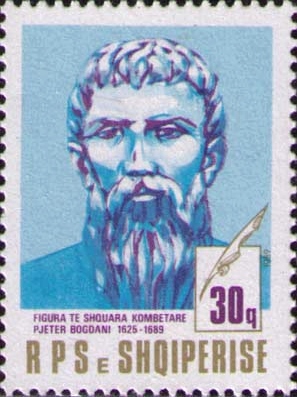
Pjetër Bogdani was the most original writer of early literature in Albania. He was author of the Cuneus Prophetarum, 1685, the first prose work of substance written originally in (Gheg) Albanian. He organized a resistance against the Ottomans and a pro-Austrian movement in Kosovo in 1689 that included Muslim and Christian Albanians.
Ervin Hatibi, Albanian poet, essayist and painter. Hatibi was born in Tirana, Albania, on May 31, 1974. At the age of 14, Hatibi published his first poems in the literary pages of the main newspapers of the epoch. His first poetry collection Përditë Shoh Qiellin, Naim Frashëri, Tirana prefaced by Ismail Kadare, was published in 1989 when he was only 15 and was widely acclaimed by the critics of the communist regime. At that time, following the sudden fame of the young author and his grooming as future national poet of the communist state, the National Film Studios of Albania "Shqiperia e Re", produced a documentary film on his works, entitled "The 15 Year Old Poet".

Attilio Bertolucci was an Italian poet and writer. He was father to film directors Bernardo and Giuseppe Bertolucci.
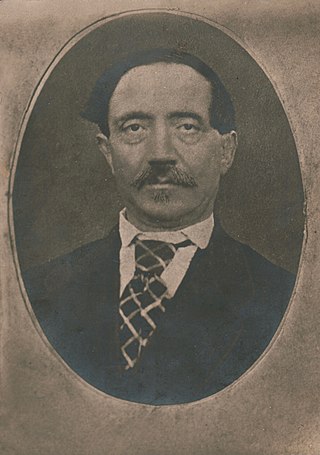
Girolamo de Rada was an Arbëreshë folklorist, journalist, lawyer, playwright, poet, rilindas and writer. He is regarded as one of the most influential Albanian writers of the 19th century who played an essential role in the Albanian Renaissance.
Ibrahim Nasrallah, the winner of the Arabic Booker Prize (2018), was born in 1954 to Palestinian parents who were evicted from their land in Al-Burayj, Palestine in 1948. He spent his childhood and youth in a refugee camp in Jordan, and began his career as a teacher in Saudi Arabia. After returning to Amman, he worked in the media and cultural sectors till 2006 when he dedicated his life to writing. To date, he has published 15 poetry collections, 22 novels, and several other books. In 1985, he started writing the Palestinian Comedy covering 250 years of modern Palestinian history in a series of novels in which each novel is an independent one; to date 13 novels have been published in the framework of this project. Five of his novels and a volume of poetry have been published in English, nine in Persian, four works in Italian, two in Spanish, and one novel in Danish and Turkish.

Krahu i shqiponjës is an Albanian national magazine that first appeared in the democratic post-communist period, in Tirana (Albania), in 1995, in progress of Bilal Xhaferri's magazine, which was published in Chicago, United States. The spiritual leader was and still remains Bilal Xhaferri.

Ernest Koliqi was an Albanian journalist, pro-Axis politician, translator, teacher and writer.

Petro Marko was an Albanian writer. His best-known novel is titled Hasta La Vista and recounts his experiences as a volunteer of the Republican forces during the Spanish Civil War. Petro Marko is widely regarded as one of the founding fathers of modern Albanian prose.

Albanian epic poetry is a form of epic poetry created by the Albanian people. It consists of a longstanding oral tradition still very much alive. A good number of Albanian epic singers can be found today in Kosovo and northern Albania, and some also in Montenegro. The Albanian traditional singing of epic verse from memory is one of the last survivors of its kind in modern Europe, and the last survivor of the Balkan traditions.
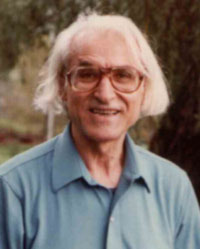
Arshi Pipa was an Albanian and American writer, philosopher, poet and literary critic.
Drago Siliqi was an Albanian poet, literary critic, and publisher. At the age of 14 he became a scout and then a partisan of the National Liberation Movement. He published his first collection of poetry, and then pursued university studies at the Maxim Gorky Literature Institute in Moscow.
The literature of Kosovo is composed of literary texts written in Albanian, Serbian, Bosnian, and Turkish, specifically by authors of Kosovo. Kosovo produced several prominent writers in the Ottoman era. However, Ottoman authorities banned the written use of the Albanian language until 1912. This policy continued during Serb rule until the outbreak of World War II.

Ndoc Nikaj was an Albanian priest, writer, and historian. He was the first Albanian novelist to write and publish an original novel in the Albanian language, Shkodra e rrethueme of 1905.
Maximilian Lambertz was an Austrian linguist, folklorist, and a major personality of Albanology.












